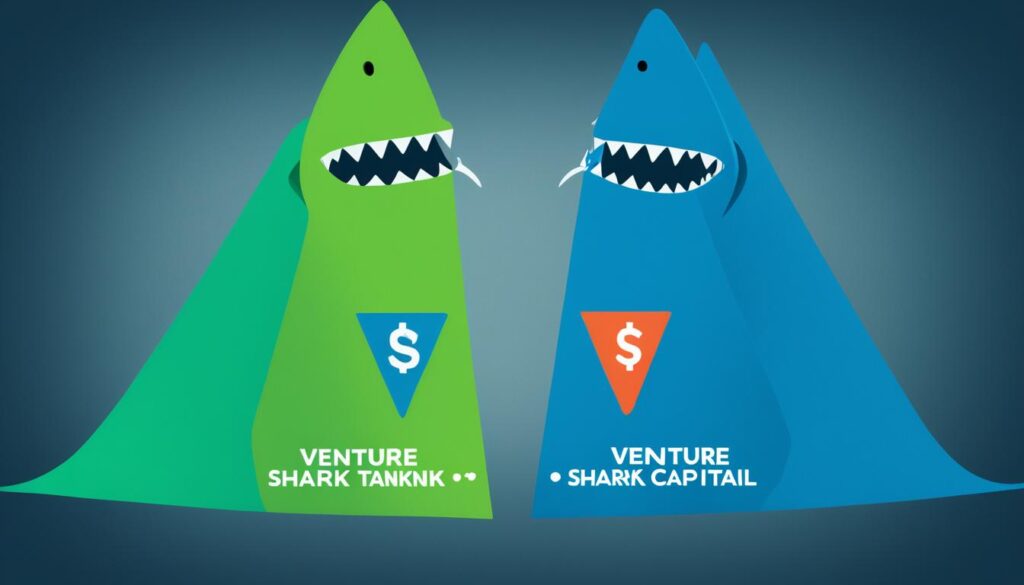The TV show “Shark Tank” is a big hit, catching the eye of many viewers with its intense business offers. But, some wonder if the way it invests is really like traditional venture capitalists. 1
The show is not only entertaining, it also teaches basic business skills. Yet, the deals made on “Shark Tank” might not be like those in the real world of startup funding.
Key Takeaways
- Shark Tank has invested over $20 million in 109 startups since its launch. 1
- The sharks have made offers to 130 companies, with 84% of those offers being accepted. 1
- The average funding raised by entrepreneurs on Shark Tank was $182,000, compared to the $210,000 they sought. 1
- The average valuation of Shark Tank deals was $466,000, lower than the $1 million initially requested. 1
- The sharks obtained an average equity stake of 39% in the companies, exceeding the 20% initial ask. 1
Introduction to Shark Tank
Shark Tank started in 2009 and is now in its 15th season on ABC. It’s loved by many because it shows how small business ideas can grow big. The idea is to present a business plan to a group of successful investors called “sharks.”
What Is Shark Tank?
Shark Tank is a place where people with big dreams get to share their ideas. They stand before a group of wealthy entrepreneurs and sell their vision.
If the idea is good, they might get help in the form of money, advice, or even just a spotlight to help their business grow.2
How Does Shark Tank Work?
Here’s how it goes: people with cool business ideas stand in front of investors. They explain their projects and hope to get money in return for a piece of their company.
Each season, over 35,000 eager folks try out. But only a lucky few get to face the “sharks” on the actual show. And even fewer make it on TV.
The chosen ones have a chance to make their case. They tell the investors how their business works and what money they stand to make. The “sharks” then decide if they want in.
The Sharks and Their Investments

On the TV show Shark Tank, the venture capitalists are called “sharks.” They are famous for their big personalities and serious business minds. These sharks have built their own unique reputations.
Some are kinder to the 40,000 entrepreneurs who apply each season. Others are quite tough. They listen to about 150 pitches where business owners share their ideas.
Do the Sharks Use Their Own Money?
The sharks we see on Shark Tank are not just any investors; they are3 successful entrepreneurs themselves. When they pick a business to support, they use their own money. This sets the show apart from others where investors use money from different sources.
Who Are the Sharks?
The Shark Tank cast includes famous investors like 3 Daymond John,3Barbara Corcoran, and 3 Robert Herjavec. Also,3 Kevin Harrington,3Kevin O’Leary,3Mark Cuban, and 3 Lori Greiner are part of the team. Together, they have put money into startups that have made 3 over $8 billion.
Shark Tank Successes

Since its start, products on Shark Tank have made over $8 billion.4 The show has seen huge hits like Bombas. They sell comfy socks and shirts and made over $225 million in sales.
Scrub Daddy and Squatty Potty each brought in over $175 million. Even Ring, a doorbell with a camera, made it big after Amazon bought it.
Shark Tank isn’t just for the big shots. Smaller businesses also have a chance. For instance, Coffee Meets Bagel, a dating app, now has 11 million users. It got big after getting money on the show.
Chef Big Shake’s seafood burgers went from selling $30,000 to $5 million. This happened after their 2011 appearance.4
Shark Lori Greiner is a big part of the Shark Tank’s success. She’s got shares in many winning companies. In total, she’s put over $9.5 million into the show and has 10 of the top 20 successful projects.4
| Product | Sales | Investor |
|---|---|---|
| Bombas | $225 million | Lori Greiner |
| Scrub Daddy | $209 million | Lori Greiner |
| Squatty Potty | $175 million | Lori Greiner |
| Ring | $1 billion | – |
| Coffee Meets Bagel | $23.2 million | – |
| Chef Big Shake | $5 million | – |
The hits on Shark Tank show its impact. The sharks’ money helps businesses grow big. From well-known names to special products, the show boosts them all.
Is Shark Tank a Venture Capitalist?

Shark Tank is known for giving entrepreneurs a chance to pitch to investors. Yet, how they invest is not the same as traditional venture capitalists. The deals are typically smaller. For example, the average investment from Shark Tank is a little over $300,000. This is much less than the $900,000 to $1.4 million that startups usually get from other sources. Additionally, the stake each business gives up is often higher on the show.
In terms of research and what they look for, the Sharks differ from other venture capital firms. Firms like Barbara Corcoran Venture Partners tend to pick businesses that are a bit more advanced. They may have already started making money (post-revenue). On the other hand, Shark Tank often showcases newer startups that may not have sold anything yet. Traditional venture capitalists focus on the business’s potential to grow and solve problems. They also care a lot about having a business model that can easily expand. These are key factors for success over time.
Moreover, funding for venture capital has been going down in the past few years. In the U.S., companies that got venture capital money went from $332 billion in 2021 to $230 billion in 2022 and $144 billion in 2023. This is a big 37% drop each year. In contrast, Shark Tank has stayed pretty stable in how it invests over time.
| Metric | Shark Tank | Traditional Venture Capital |
|---|---|---|
| Average Investment | $300,0005 | $900,000 – $1.4 million1 |
| Average Equity Taken | 24.99%5 | 15-30%1 |
| Average Valuation | $466,0001 | $4.6 million – $6 million1 |
| Startup Stage | Earlier-stage6 | Post-revenue Seed/Series A6 |
In short, while both Shark Tank and traditional venture capital want to help new businesses, they work differently. Shark Tank is easier for new entrepreneurs to get into but offers smaller and riskier deals. In comparison, traditional venture capital provides larger investments to more advanced ventures with less equity. Each has its benefits and drawbacks for entrepreneurs seeking funding.
Business Lessons from Shark Tank

Those on Shark Tank, whether contestants or viewers, pick up worthwhile business skills. They learn from seasoned investors who closely look at the market before investing.6 A key point is that companies backed by Barbara Corcoran’s group are quite advanced. They emphasize the need for founders to know their field well and explain how their offer sets them apart.7 Mark Cuban reminds us that big markets alone don’t ensure success. This stresses the importance of proving the demand for your product or service.
Understand Your Competition
Shark Tank investors are veterans who do a thorough check of the market before deciding to invest. Companies in Barbara Corcoran’s portfolio are already well-developed. It reinforces the need for entrepreneurs to be well-informed in their area and explain their unique value.7 Mark Cuban makes a good point that big markets aren’t all you need. You must show why your business is necessary.
Confidence Is Key
Entrepreneurs who succeed on Shark Tank are confident in their ideas and abilities.6 It’s best if the entrepreneur has past success to prove themselves. This, alongside solid market knowledge, helps win over the investors.7 Many founders worry about losing control of their company. This shows how important it is to stay cool and confident during discussions.
Negotiation Is Part of the Game
The Sharks are hard negotiators, so entrepreneurs need to be ready to haggle.7 One instance involved a founder who wanted a big investment with minimal equity. This inflated their company’s value. It teaches entrepreneurs to carefully pick their investors, considering more than just money.6 Businesses backed by Barbara Corcoran Venture Partners should be good at getting customers without spending too much.
Comparison with Traditional Venture Capital

Shark Tank lets entrepreneurs pitch to investors, but the deals are quite different from those in the usual venture capital world.1 On average, contestants get around $182,000 in funding. This is less than the $210,000 they asked for.1 Also, the show’s valuations are often lower than what the entrepreneurs wished for. They usually hope for a $1 million valuation but get around $466,000 instead. The sharks typically claim about 39% of the business, more than the 20% most wanted, not counting the 5% the show gets.1
Shark Tank Deal Terms
Shark Tank deals tend to favor investors. This is because the valuation multiples are lower, at 4.2 times the revenue and 10.0 times the profit,1 compared to usual venture capital terms. In these deals, entrepreneurs usually lose more of their company, with the sharks taking about 39%. This is compared to about 15% in regular venture capital deals.1
Venture Capital Deal Terms
On the other hand, early-stage venture capital deals are much better for entrepreneurs.1 In 2012, in these typical deals, entrepreneurs raised around $900,000 in funding or $1.4 million. This was done at valuations of $6.0 million and $4.6 million, respectively.1 Outside of Shark Tank, the amounts raised were five times larger, with valuations 13 times higher. This shows a big difference in outcomes.1
This shows the varying aims and methods in both investment areas.5 Shark Tank provides chances for national exposure and investment. However, the terms of these deals may not be as good as the usual venture capital deals offer.5
Benefits of Appearing on Shark Tank
The Shark Tank show has big perks for those entrepreneurs who make it on.8 They get a chance to show their brand to the whole nation. This can lead to more sales and a stronger business.
National Brand Exposure
Being on Shark Tank means your products or services get seen across the country.8 With thousands of companies wanting a spot but only a few getting it, it’s a big deal to pitch to the Sharks. This change alone can make a company much more known and trusted.8 It can help in selling more, getting new customers, and making the brand better known, even if no deal happens with the Sharks.
Promotional Value
Shark Tank isn’t just about investment; it’s a great promotion tool.8 The Shark Tank Effect shows how companies can get a big sales and exposure boost after the show. This boost can change the game for entrepreneurs looking to expand their business. Shark tank benefits, entrepreneurial exposure, and business promotion.8 Just being on the show can lead to more sales, a bigger social media following, and more people recognizing your brand. All these help make the business more successful in the long run.
Shark Tank might not always offer the best investment terms. But its chance for huge promotion makes it worth considering for many entrepreneurs.8 It can help new businesses grow and become better known across the country.
Drawbacks of Accepting Shark Tank Offers

Shark Tank can be great for entrepreneurs. It offers a chance for investments and national attention. But, there are downsides to consider too.8 Each year, over 40,000 companies want to be on the show. But, only 158 of them get to pitch their ideas. And just 88 are shown on TV in a season.8 Even if a “yes” is given by the Sharks, only 27 companies close deals because of loads of paperwork and checks.8 Often, founders end up not agreeing to the terms, causing about 90% of the on-air deals to fall through.8
The amount of ownership the Sharks take is another potential issue.8 On average, they ask for 18% of a company. This is more than what other investors typically ask for.8 There have been 18 deals made where the Shark only wanted 5%, which is quite high.8 Giving up this much ownership can limit an entrepreneur’s control over their company’s future. It can affect their decisions in the long run.8
Also, not every company backed by a Shark makes it. 57 of them have failed.8 This shows the high level of risks in getting funding this way. Entrepreneurs need to carefully think about the balance between the show’s benefits and its challenges.8
Perspectives from a Venture Capitalist

To know the difference between Shark Tank and traditional venture capital, looking at investors’ views helps. Experienced investors in startups use a strict method with specific criteria. This approach gives key insights into their decisions, which might not be clear on Shark Tank.
Disciplined Approach
Phil Nadel, who backed over 60 startups6, emphasizes a disciplined and data-focused approach. He looks at companies beyond the startup phase, not the pre-revenue businesses on Shark Tank6. Phil, a Wharton grad, and Barbara Corcoran stress the importance of KPIs. These indicators show how well a company can grow and attract customers without spending too much 6.
Having a tight budget and targeting real problems is good, according to venture capitalists. They warn that overspending and lack of focus are big startup issues6. Pro investors in this field get better deals and more data. This helps them make wise choices 6.
Evaluating Founders and Ideas
Venture capitalists look for specific qualities in startup teams and ideas. They like strong teams with a successful history and honesty about their skills and flaws6. Passion, determination, and a sharp grasp of the market and customer needs also matter. They aim to support founders who can bring their plans to life6.
A key finding is that some venture capitalists prefer investing in businesses run by women6. This highlights the benefit of varied viewpoints and backgrounds in business.
Shark Tank is thrilling to watch, with its drama and risks. However, the methodical, evidence-based approach of venture capitalists shows how startup investments are evaluated. This insight can help entrepreneurs better understand the competitive startup funding world.
Women Entrepreneurs and Diversity

Shark Tank shines a light on women entrepreneurs and diverse founders. Yet, the venture capital industry still has room for improvement in this area.9 Last year, U.S. startups led by women got less than 2% of the venture capital funds. This was out of over $238 billion given out.9 In 2021, these startups got 2.4% of the total.9 Female business owners often face hidden prejudices. Examples include the reactions on “Shark Tank”. What’s more, getting funding for revolutionary ideas can be tougher because of unconscious bias from investors.
9 The venture capital sector is mostly influenced by men. This can lead to gender bias in funding choices. The idea that women should be polite and supportive can go against the traits often linked with entrepreneurship, like leading and being daring.10 Still, research shows that gender doesn’t affect how well a pitch does on Shark Tank, no matter the industry. Companies started by women grow their sales more than those run by men.
6 Despite challenges, companies with female founders are gaining investors’ interest. But the number of female-led startups isn’t rising as fast as we’d like to see.6 It’s essential to note that teams with various skills can greatly help a company succeed. Plus, startups that begin with co-founders who have different strengths tend to do well. This is clear from the success of companies such as Google, Amazon, Facebook, and Apple.
Exit Timelines and Valuations

Startup exits, like those seen on Shark Tank, are quite different from traditional venture capital deals. While pitching on Shark Tank can help you get money and noticed, the deals you make there might not match the valuations and timelines bigger investors look for.2
Shark Tank investors often focus on how much money a company makes or will make and what it’s worth in the market. They decide how much of the company to give away in exchange for investment, linking the company’s value to its current money earnings.2 On the other hand, venture capitalists dive deep into a company’s worth over time. They look at things like brand strength, unique products, and efficient ways of doing business. These things help them see the true value of a venture.2
Venture capitalists’ interests are different; they deal with new businesses’ risks by offering investments that take these risks into account. They might change their investment offers based on how risky the venture is and how easily they can get their money back. This approach can lead to different ways of calculating a business’s value and how long the investor plans to be involved, unlike the usually straightforward deals often seen on Shark Tank.2 They might even look at how similar companies in the market value themselves to understand if the investment is a sound business decision.2
| Metric | Shark Tank | Traditional Venture Capital |
|---|---|---|
| Valuation Methods | Revenue multiples, earnings multiples, future market valuations | Revenue multiples, earnings multiples, intangible factors (brand, patents, supply chain) |
| Funding Structure | Ownership percentages based on current revenue | Long-term investment horizon, risk-adjusted discounting |
| Valuation Approach | Focused on current sales and profits | Focused on future growth potential, industry trends, and market demand |
Shark Tank is a great starting place for many entrepreneurs. However, the exit strategies and valuations shown there often differ from what traditional venture capitalists expect. Entrepreneurs need to think about the long-term results of choosing a Shark Tank deal over going the traditional venture capital route. They must be aware of what they might gain and what they might have to give up in the long run.2
Conclusion
Although Shark Tank is thrilling to watch, its investment method is quite different from traditional venture capital ways. On Shark Tank, entrepreneurs get a shot at nationwide recognition and investment. Yet, the “sharks” use unique terms and ways to figure out a deal’s worth, unlike professional venture capitalists.6
Phil Nadel, a venture capitalist in over 60 startups6, and Barbara Corcoran, focused on growing businesses after the Seed phase or during Series A6, look for certain key points. They want to see growth, how well you can attract more customers, and if the main person has successfully started or sold other businesses before 6. But in Shark Tank, what gets offered can change a lot because each investor has their way of getting things done.
In the end, Shark Tank does offer a cool stage for ideas and money to happen. But remember, the world of startup investing is even bigger than what you see on TV. It’s crucial for entrepreneurs to think hard about any deals from Shark Tank. They need to consider if it fits their long-term plans and if it matches what traditional venture capitalists look for.6
FAQ
What is Shark Tank?
How does Shark Tank work?
Who are the Sharks?
What are some of the most successful deals from Shark Tank?
How do Shark Tank deals differ from traditional venture capital?
What are some key business lessons from Shark Tank?
What are the benefits of appearing on Shark Tank?
What are the potential drawbacks of accepting Shark Tank offers?
What is the perspective of experienced investors on the differences between Shark Tank and traditional venture capital?
How does Shark Tank address the issue of diversity in entrepreneurship?
How do the timelines and valuations of Shark Tank deals compare to traditional venture capital investments?
Source Links
- https://www.forbes.com/sites/georgedeeb/2013/10/09/comparing-shark-tank-to-venture-capital-reality/
- https://www.investopedia.com/articles/company-insights/092116/how-business-valued-shark-tank.asp
- https://www.bryantstratton.edu/blog/2023/november/love-shark-tank-lets-dive-into-entrepreneurship
- https://www.investopedia.com/articles/investing/082415/10-most-successful-products-shark-tank.asp
- https://www.forbes.com/sites/shimiteobialo/2024/04/30/vc-backed-founder-pitches-on-shark-tank–is-this-a-trend/
- https://thunderbird.asu.edu/thought-leadership/insights/what-happens-when-shark-tank-meets-venture-capital-seriously
- https://lindenlawpartners.com/4-lessons-from-shark-tank-be-a-founder-not-a-flounder/
- https://slidebean.com/blog/the-real-numbers-behind-shark-tank
- https://phys.org/news/2023-07-shark-tank-reveals-women-funding.html
- https://open.fau.de/bitstreams/a05078c6-66ee-49b5-8226-ce9046246bcf/download
